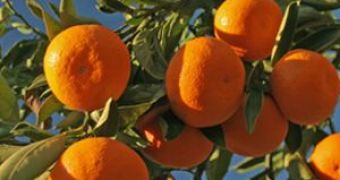Even if mandarins' health benefits have been overlooked until now by experts in nutrition, it seems that the "humble" citrus fruits are quite potent against severe diseases such as liver cancer, diabetes, heart attack and stroke. Two recent Japanese studies found that people who eat mandarins or drink natural mandarin juices on a regular basis have a lower risk of developing arteriosclerosis (the hardening of arteries which can bring about stroke or heart attack), insulin resistance (manifested in diabetes) and liver disorders.
A first study was conducted by a Japanese team from the National Institute of Fruit Tree Science on 1,073 volunteers, living in the Mikkabi town, in Shizuoka. Subjects in the study were asked to consume a large amount of citrus fruits and then had blood tests taken. Blood samples revealed that mandarins really leave chemical markers in eaters' serum, which are going to reduce their chances of developing the above mentioned serious conditions.
It seems that the beneficial properties of mandarins are closely connected to their high content of carotenoids - the vitamin A which also acts as a natural pigment in these fruits, giving their orange color. The yellow-orange pigment in fruits and vegetables is given by the betacarotene, a natural compound that improves eyesight and helps the heart to function accurately, strengthens the immune system, prevents against cancer and is an anti-aging and anti-wrinkling agent for the skin. Part of the carotenoids compounds is stored in the liver and, when the body feels the need, it converts it into vitamin A.
Betacarotene is a photopigment usually related and connected to the vitamin A in plants. It is stock-piled in the epidermis, most precisely in the membranes of skin cells, and in the subcutaneous fatty tissue. Here it performs a very important function, as betacarotene absorbs the UV rays radiation without allowing it to damage the tissues of the skin. This is how the natural protection of the skin works against the harmful effects of the sun.
Besides mandarins, oranges, tangerines, grapefruit, betacarotene is also present in pumpkins, pears, carrots, saffron, pineapples, bananas, mango fruits etc.
The second study was carried out by researchers at the Kyoto Prefectural University of Medicine who investigated the effects of carotenoids in mandarins in 30 viral hepatitis patients. On the other hand, the team also studied 45 viral hepatitis patients who did not include mandarins in their diets. The 30 volunteers in the former group have been drinking one glass of mandarin juice daily for a year. The 45 subjects in the latter group did not consume mandarins on a regular basis. After the one year trial period, tests showed that 8.9% of the subjects who did not consume mandarins presented signs and symptoms of liver cancer. But participants in the mandarin-juice group were all free of liver cancer.
Cathy Ross, cardiac nurse at the British Heart Foundation advised both healthy and ill people to consume as much natural foods as possible because fruits and vegetables enhance our health. "The more types of fruit and vegetables you can include in your diet the better," she concluded after consulting the two studies.

 14 DAY TRIAL //
14 DAY TRIAL //